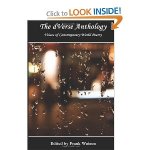(On use of the English language)
[This piece was published on The Bardo Group Blogazine, in December 2013. I've reproduced it here for the sake of continuity on my own prose blog as well as, perhaps, to reach some readers, who may not have seen it yet]
" ... To edit perchance to publish: ay, there's the rub;
For in that edit of death what publishings may come
When we have shuffled off this mortal coil,
Must give us pause ... "
(Editing liberties taken with Hamlet’s famous soliloquy, with thanks and apologies to William Shakespeare)
Jamie Dedes suggested that I should write about my experience of publishing. I thought about this, but came to a conclusion that it would be pretentious to do so, because it would appear like someone, who had just successfully completed their first length of the swimming pool, writing a book on swimming the English channel! However, there is something to write about in any experience, however humble. So, I decided instead to write about it from a perspective, where I have a little more to offer. This is the business of writing the English language.
Designing the book’s layout, selecting and agreeing cover designs, which fonts to use, finding someone to write a foreword, or not, decide who should write the introduction is much to do with publishing. Reading it all front to back, back to front, several times over, has more to do with being competent in the language and brings much to bear on the business editing!
 To cast a glance at the experience I had in publishing "Petrichor Rising", before the publisher came along, thinking that we might have to self-publish, I designed the layout, asked one of the group to write the introduction and, after playing with the idea of asking an award winning published poet I know to write a foreword (with the vain idea that it might give the book some kudos), eventually decided to write it myself. All that remained was to get the covers designed and ... Edit!
To cast a glance at the experience I had in publishing "Petrichor Rising", before the publisher came along, thinking that we might have to self-publish, I designed the layout, asked one of the group to write the introduction and, after playing with the idea of asking an award winning published poet I know to write a foreword (with the vain idea that it might give the book some kudos), eventually decided to write it myself. All that remained was to get the covers designed and ... Edit!
After several runs through it, I got to a point where I needed to ask ‘editorial questions’ of the contributing poets, which were in a variety of different forms. I felt sure that, if I were to uphold the integrity of the book, I was compelled to verify some of the simplest things, like spelling, grammar, English usage, the odd neologism and even the position of punctuation marks.
My golden rule was always that I should change not one single word without the consent of any of the authors. So, I grabbed the horns! Accordingly, I received a variety of responses, which ranged from unquestioning acceptance of my suggested edits, through "no that's the way I intended it" to a significant re-editing of a poem. This was, or so I thought, one of the final hurdles to publication.
I eventually submitted the whole book to the publisher, who, within a short time had clearly read it through very thoroughly, because they returned it with a whole list of further edits, which comprised of spelling errors, general typo’s, even punctuation and the odd grammatical error! An even greater shock to my pride was that a number of them were within my own writings! I had to agree with almost all of them! What am I like! Evidently rather poor at self-editing!
As for English grammar, there are some rules that I’m keen on. Even in poetry, I prefer to write English in complete sentences between full stops, with any main or subordinate clauses that have a subject and a predicate, any phrases suitably punctuated, words chosen for their proper meaning, as defined by a recognised dictionary (my preferred backstop is Fowler’s Concise Oxford English Dictionary) spelled correctly and, particularly in poetry, with no unnecessary repetition.
Amongst the rules I use, that I can rarely bring myself to break, include the use, in comparisons, of certain prepositions after the word ‘different’. My personal loyalty lies with the traditional ‘from’; there are no circumstances under which ‘from’ cannot be used in this context; the alternatives used are ‘to’ (don’t know where this came from, but it is widely used in the media) and ‘than’ (more popular in North America), which sometimes permits a greater economy of words when ‘different’ is followed by a clause. So, in my book, it should be "different from".
The next one is the split infinitive. Once again, I would argue that there are no circumstances in which the infinitive form of a verb has to be separated from its preposition (‘to’) by any other word. The only possible exception could be in poetry, where one might want to split the infinitive for the sake of maintaining consistent scansion. Even then, I would argue that there is no sentence that cannot be re-written in a different way, expressed with different words, to achieve the same effect; such is the variety of the English language.
Poets and writers have a great responsibility to communicate accurately, however perverse, complex or deep the story line. This super-fast digital age, with its plethora of social communication devices, has encouraged a laziness in the use of language and, therefore, a greater risk of misinterpretation, which transfers to our working lives too. In the last twenty-five years of my working life, I witnessed a tendency for the generation, who have grown up with the digital computer age, to be ‘quick’, to empty the overloaded inbox as fast as they can and, in so doing, often write incomplete sentences that are easily misunderstood and that consequently waste time in clarification or, worse still, cause decisions to be wrong!
Economy of words is important in all writing, particularly poetry, which can only be enhanced by choosing the right words and concatenating them so as to achieve the meaning intended and, in this way, one should always aspire to achieve synergy, which is to say making the whole, the final result, greater than the sum of its parts. Shortening sentences, however, for the sake of speed is just lazy and symptomatic of an unwillingness to think more carefully about the language.
I hope, in any future attempt to publish a book, that I will remember this; remember how important it is to communicate our meaning accurately, and, thereby, truthfully. As far as I am concerned, I am still learning.
- John Anstie
© John Anstie, essay, all rights reserved
RELATED FEATURE:
"Petrichor Rising" and how the Twitterverse birthed friendships that in turn birthed a poetry collection, by Jamie Dedes, The Poet by Day, the journey in poem

 JOHN ANSTIE (My Poetry Library and 42) ~ is a British poet and writer, a member of the core team here at Bardo, and multi-talented gentleman self-described as a "Family man, Grandfather, Occasional Musician, Amateur photographer and Film-maker, Apple-MAC user, Implementation Manager, and Engineer. John participates in d'Verse Poet's Pub and is a player in New World Creative Union. He's been blogging since the beginning of 2011. John is also an active member of The Poetry Society (UK).
JOHN ANSTIE (My Poetry Library and 42) ~ is a British poet and writer, a member of the core team here at Bardo, and multi-talented gentleman self-described as a "Family man, Grandfather, Occasional Musician, Amateur photographer and Film-maker, Apple-MAC user, Implementation Manager, and Engineer. John participates in d'Verse Poet's Pub and is a player in New World Creative Union. He's been blogging since the beginning of 2011. John is also an active member of The Poetry Society (UK).
John has been involved in the recent publication of two anthologies that are the result of online collaborations among two international groups of amateur and professional poets. One of these is The Grass Roots Poetry Group, for which he produced and edited the anthology, "Petrichor* Rising". The other group is d'Verse Poet Pub, in which John's poetry also appears in The d'Verse Anthology: Voices of Contemporary World Poetry, produced and edited by Frank Watson.
No comments:
Post a Comment
Don't leave without letting me know what this article made you think, how it made you feel ... good or bad, I'll take either.